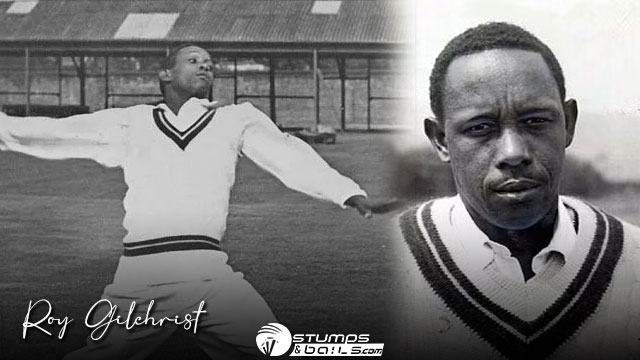If there was ever a discussion on the most dangerous player in the history of cricket, it would include Roy Gilchrist. Gilchrist was a fast bowler. His job was not just bowling but he would get passionate if he could not remove the batter on the ground. There was one such incident that showed the world his most infuriating version ever. Here in this article, we talk about the Most dangerous fast-bowler in the history of cricket.
There is no denying that Gilchrist has the ability to develop into an imposing fast bowler of world-class caliber. Gilchrist’s Test career was already finished at the age of 24 by the time Charlie Griffith and Wes Hall became one of the most dangerous new ball assaults in the world. Before he was 29, his First-Class career came to an end.
Without a doubt, it was not the intended outcome. He had 57 wickets at an average of 26.68 and a strike rate of 56.6 in the 13 Tests he had played. He took 167 wickets at an average of 26.00 and a strike rate of 50.2 in 42 First-Class games. By any measure, they are great figures.
Hall, who amassed 192 wickets from 48 Test matches at a strike rate of 54.2, appears to be a comparison for Gilchrist’s career. Given that Hall was the more committed and composed of the two, the stats are remarkably close, despite the fact that Hall outlasted his rival. Griffith’s statistics were 94 wickets from 28 Test matches at an average of 28.54 and a strike rate of 59.9; aside from longevity, there was not much to distinguish the three players.
Both Hall and Gilchrist were portrayed by Chandu Borde, who contrasted the two actors by saying, “Hall was quick in spots and used to alter his speed skilfully. Gilchrist had incredible stamina and was constantly moving quickly.
The Indians were not very skilled fast bowlers in the late 1950s. Gilchrist’s criminal companion on that tour, the 21-year-old Hall, only made matters worse. Gilchrist scored 4 for 39 while Hall scored 3 for 35 in his first outing, but like with Gilchrist, there was another valiant effort.
The fact that Gilchrist had only played in three series, West Indies had dominated the opposition in each series’ first Test, and each of the Tests had ended in a fightback may have been a coincidence.
The Indians had been receiving a lot of bounces from both Hall and Gilchrist. Alexander, a Cambridge-educated man, did not agree with this but waited until things got out of hand before intervening. Gilchrist appeared to be going a bit farther than Hall, who normally tried to intimidate the batsmen into surrender by inflicting physical harm on them.
Gilchrist, who was not satisfied with bouncers, used beamers even in the tour matches against weaker batsmen. Alexander made the wise decision to step in at that point, and he did so.
In another lopsided match, West Indies won the fourth Test in Madras with ease thanks to five wicket hauls from Gilchrist and Hall. More importantly, though, was the fact that Gilchrist had continued to bowl bouncers and beamers.
Borde’s bravery will be remembered more than anything else from the last Test in Delhi. Borde hit 109 and 96 against some of the most aggressive bowling to win the Test. With a snorter, Gilchrist fractured Vijay Manjrekar’s arm. Gilchrist’s bouncer was highly risky, Borde later said. The aim used to be unerring and it used to slide onto you. He frequently bowled an over with four bouncers.
With 26 wickets from 4 Tests, Gilchrist finished the series with a 16.11 average. The Indians were completely outclassed, dropping the series 0-3, with to Hall’s 30 wickets from 5 Tests at an average of 17.67.
Despite the severity of the offense, Gilchrist only had to serve three months of his three-month probation. “I hate to believe English sport has degraded so far that brutes will be permitted because they are skilled at games,” the judge stated when announcing the decision.
He had Parkinson’s disease, and on July 18, 2001, he passed away. The sermon was given at his burial by Hall, who was at this time a Reverend and the President of WICB. Gilchrist was referred to as “one of the early legends of West Indies fast bowling” by Hall in a subsequent interview.


